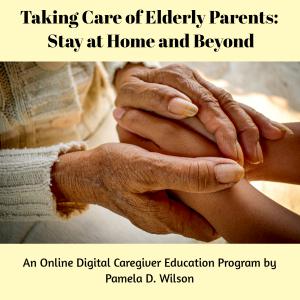What to Do When When Caregiving Problems at Home Result in Employee Productivity Problems at the Office
How to manage work-life challenges that result in absenteeism, disengagement, a lack of teamwork, depression, and poor health for working caregivers.
GOLDEN, CO, USA, July 7, 2020 /EINPresswire.com/ -- What is your human resources department doing to reduce employee productivity problems at the office that result from caregiving problems at home? If you are like most corporations, you may not realize you have a caregiving problem.
A deep-dive digital caregiving program, Taking Care of Elderly Parents: Stay at Home and Beyond by expert, Pamela D Wilson provides a caregiving awareness plan and direct employee education in an extraordinary elder care solution for human resource departments.
Do Managers Contribute to Employee Productivity Problems?
A Harvard Business Review study confirms that direct reports frequently ask for personal advice from managers who spend between 2-3 hours each week responding to mental health, caregiving, and marital problems. Research by Bensinger, DuPont & Associates confirmed that forty-seven percent of employees say that issues in their personal lives sometimes affect their work performance.
Managers feel torn between focusing on job performance and listening to employees. Some employees expect support from managers in return for going the distance at work. Managers who take on the role of a counselor can cause more significant problems in the workplace when the time arrives for performance reviews.
Managers fail to discuss this counseling role in their job with human resource managers out of a hesitancy to disclose involvement in the personal issues of an employee. Crossing professional boundaries between managers and employees should be balanced by exhibiting empathy and compassion instead of becoming a confidant or advisor.
The Hidden Stress of Caregiving
Working employees may not realize they are caregivers for elderly parents because they see themselves in a helping role. By the time an employee understands that he or she is a caregiver, work-life balance may be teetering on the edge of crises.
Workplace performance is negatively affected by caregivers who feel unprepared and lack confidence in their ability to care for elderly parents. This worry and negativity can result in productivity concerns noticed by managers. Wilson's on-demand webinar offers in-depth information about the caregiving employee experience for human resource managers.
How Corporations Can Support Working Caregivers
Corporations can demonstrate support for working caregivers in a variety of ways. Knowing the support that managers can offer is one of the first steps in creating an employee awareness program on the subject of elder care. The human resource department should create a go-to document for managers with employee policies for work and other arrangements to accommodate caregiving responsibilities.
The workplace should make elder care programs available, and promote employee participation as a positive way to manage stress, provide training, and to improve workplace productivity. When elder care awareness programs exist, employees should not fear to disclose caregiving responsibilities to supervisors. Workplace elder care programs allow supervisors to refer employees to a confidential program for support.
Taking Care of Elderly Parents: Stay at Home and Beyond
This practical human resource management caregiver program combines health, wellness, caregiving, life planning, and workplace skills. Caregiving expert, Pamela D. Wilson shares proven processes, relevant anecdotes, and humor to connect with program participants.
Eight modules feature 70 webinar lessons—28 hours of education— plus 24 hours of podcasts to deliver an outstanding 52-hour program in the field of caregiver programs, resources, and education. Wilson’s deep dive digital caregiver program, Taking Care of Elderly Parents Stay at Home and Beyond, offers a start to finish plan to manage care for aging loved ones. This program is the missing link for employee health and wellness programs that may struggle to find relevance with employees.
Employes Learn Care Management from The Care Navigator
Participants gain knowledge specific to caring for the elderly that links to the concept of employee development in this human resource management caregiver program. This extraordinary program enables participants to learn and implement care management techniques developed by Wilson and used in a prior endeavor, a care navigation business serving the elderly and their caregivers as a care manager, court-appointed guardian, medical and financial power of attorney, trustee, and personal representative of the estate.
Through participation in this program, caregiving employees should be able to manage health, daily care, prevent emergencies, and plan for the future of care for themselves and elderly loved ones. The practical skills emphasized in this program combine with usable skills in the workplace—resulting in a win-win for human resource departments who desire to offer employee training. Wilson's experience in training and education for caregivers is unparalleled.
For more information about caregiving and elder care programs for the workplace, call Pamela D. Wilson at 303-810-1816 or email Inquiry_For_Pamela@PamelaDWilson.com. The program may be purchased individually. Special pricing is available for groups and corporations interested in multiple copy use of the program.
P Dombrowski-Wilson
Pamela D. Wilson, Inc.
+1 303-810-1816
email us here
Visit us on social media:
Facebook
Twitter
LinkedIn
Advocating for Elderly Parents



